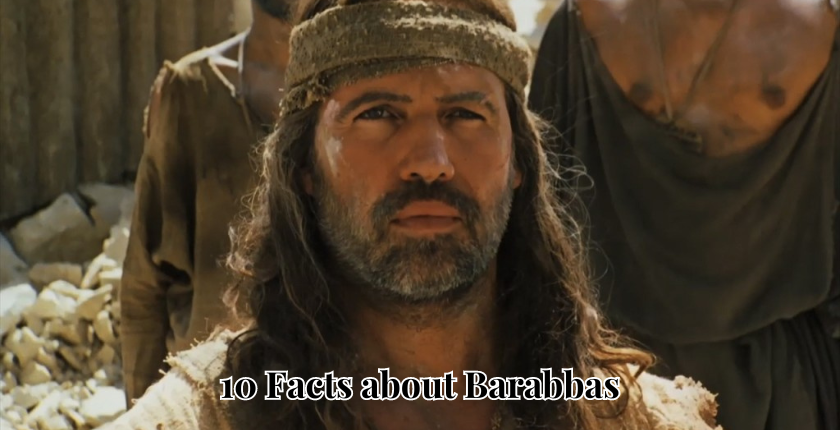Table of Contents
Barabbas is a name that has echoed through history, forever intertwined with the story of Jesus’ crucifixion. He was the criminal whose life was spared at the expense of the Son of God. While his story is brief, it holds profound significance in the biblical narrative.
In this article, we’ll delve into 10 fascinating facts about Barabbas, shedding light on this enigmatic figure from the Gospel accounts.
10 Facts about Barabbas That You Should Need to Know

Barabbas was a prisoner in Jerusalem who, according to the Gospels, was chosen to be released instead of Jesus by the crowd when Pontius Pilate offered to pardon one prisoner during the Passover festival.
Here are 10 interesting Facts about Barabbas below:
Barabbas: The Name and Its Meaning
The name “Barabbas” is of Aramaic origin, translating to “son of the father” or “son of the teacher.” Some scholars suggest it could also mean “son of the rabbi,” implying a connection to a religious or scholarly lineage. However, the exact meaning and origin of his name remain shrouded in mystery.
A Notorious Criminal
The Gospels describe Barabbas as a “notorious prisoner” (Matthew 27:16) and a “rebel” (Mark 15:7) who had been murdered during an insurrection. These descriptions paint a picture of a man who was no stranger to violence and rebellion against the Roman authorities.
The Choice Between Barabbas and Jesus
One of the most well-known facts about Barabbas is the pivotal moment when Pontius Pilate, the Roman governor, presented the crowd with a choice: to release either Barabbas or Jesus. According to the Gospels, the crowd demanded the release of Barabbas and called for Jesus’ crucifixion.
A Political Prisoner or Common Criminal
While the Gospels describe Barabbas as a murderer, some scholars speculate that he may have been a political prisoner or a member of a Jewish resistance movement against Roman occupation. This theory stems from the description of him being involved in an “insurrection” (Mark 15:7).
The Significance of Barabbas’ Release
The Christian tradition attaches symbolic importance to Barabbas’ release. According to certain interpretations, it symbolizes the release of humanity’s evil nature and the taking on of the penalty by Jesus, the innocent, on our behalf. Some perceive it as the realization of the Old Testament custom of freeing a captive during the Passover celebration.
Barabbas’ Life After Release
Regarding what happened to Barabbas following his release, the Gospels say nothing. Apocryphal narratives like the Gospel of Nicodemus imply that he afterward turned to Christianity and followed Jesus. These stories, however, are viewed as legendary and are not included in the canonical Scriptures.
Barabbas in Art and Literature
Barabbas has been a subject of fascination for artists and writers throughout history. He has been depicted in various forms of art, including paintings, sculptures, and literature. Notable works include the novel “Barabbas” by Pär Lagerkvist and the film adaptation directed by Denys Arcand.
Barabbas and the Concept of Substitution
Some have taken the parable of Barabbas and Jesus as an example of the idea of substitution. According to this interpretation, Jesus replaced Barabbas on the cross to atone for humankind’s sins and provide the highest price possible for our salvation.
Read also: Dinar Detectives
Barabbas as a Symbol of Human Choices
Some theologians and scholars see Barabbas as a symbol of the choices humanity makes. The crowd’s decision to release a known criminal while condemning an innocent man represents the human tendency to choose sin and rebellion over righteousness.
The Enduring Mystery of Barabbas
Despite his significance in the Gospel accounts, Barabbas remains a figure shrouded in mystery. His background, motivations, and eventual fate are left largely unexplained, leaving room for speculation and interpretation throughout the centuries.
People also ask
What are some interesting facts about Barabbas in the Bible?
- Described as a rebel involved in insurrection and murder.
- Released by Pontius Pilate over Jesus at the crowd’s demand.
- His name might mean “son of the father” or “son of the teacher.”
What was Barabbas’ real name?
The Bible doesn’t say, but some theories suggest it could have been Jesus Barabbas.
Whatever happened to Barabbas?
The Bible is silent on his fate after his release.
What can we learn from Barabbas?
- Highlights the complex political climate of Judea under Roman rule.
- Symbolic in Christian theology of Jesus’ sacrifice for humanity.
Final Words
The intriguing tale of Barabbas, the man picked over Jesus, never fails to captivate and motivate people. The lasting fascination with Barabbas, from his mysterious identity to the deep significance surrounding his release, is revealed in these 10 facts about him from the Bible. Whether seen as a historical figure, a metaphor for human decision, or something else entirely, Barabbas’ legacy is inextricably linked to the crucial events surrounding Jesus’ crucifixion, serving as a constant reminder of the significance of this period in the history of Christianity.




